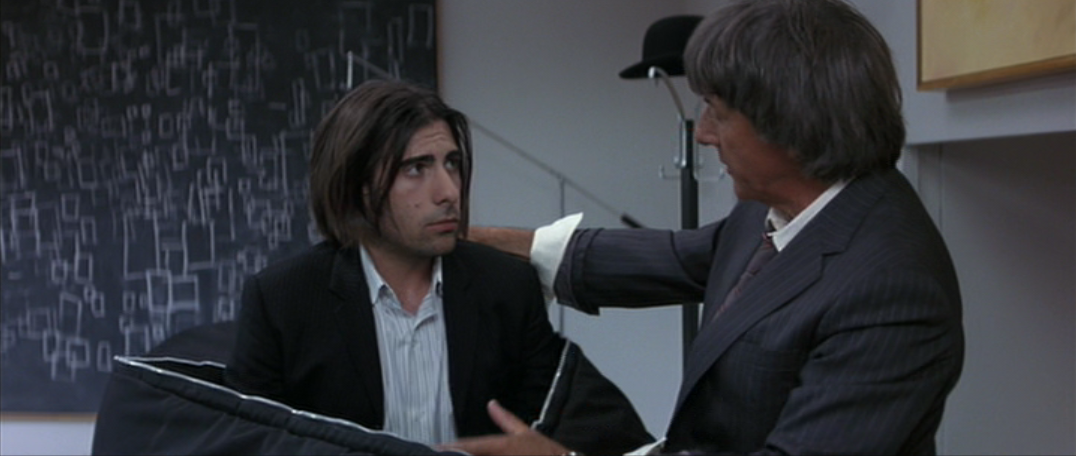I Heart Huckabees is a strange little film. It seems to me that many didn’t quite know how to take it. I was drawn to it, personally, due to its philosophical themes (and its great cast), but have talked with others who study philosophy with whom it didn’t land. And, honestly, I don’t know that it did for me, either, the first time. But it stuck in my mind enough that I watched it again.
The thing is that, although the film plays with existentialism, it doesn’t feel that deep. This isn’t a film that calls out for thorough analysis, or might make you want to read Heidegger, so much as it is a comedy. And this is how it should be taken. I didn’t know quite what to make of it on my first viewing, but when I gave it a second—knowing what it was in a meaningful way—I found it to be absolutely hilarious in a distinctive way.
This isn’t the kind of comedy you get elsewhere. It is neither slapstick, nor the kind of humor that plays on awkwardness that has become so common. It is, fundamentally, a comedy about the human condition.
Albert (Jason Schwartzman) goes to the Existential Detective agency because he has encountered the same tall African man several times, and this coincidence has got him wondering about life and the everything. Vivian (Lily Tomlin) and Bernard (Dustin Hoffman) are all too willing to help, with the former telling Albert that what they see as he flosses or masturbates may just be the key to everything, while the latter zips him up in what amounts to a body bag to isolate his everyday anxieties.

“Have you ever transcended space and time?” Vivian asks.
“Yes. No. Well time not space. No, I don’t know what you’re talking about,” Albert replies.
This is hilarious. The whole scene is hilarious, and so is the whole film, taken in the right way. From Albert’s environmentalism to Tommy’s (Mark Wahlberg) rant about petroleum to the “ball thing” I Heart Huckabees offers a laugh a minute so long as you take it on its own terms.
Tomlin and Hoffman’s existential detectives are offset by Caterine (Isabelle Huppert), who offers a far more nihilistic point of view. Thus, I Heart Huckabees does grapple with the absurdity of existence, and the deep question of how to be in the world; it simply does so with levity. It offers two competing views: 1) the everything is connected, and thus meaningful; and 2) that everything is basically meaningless.
These are basically two valences of the same thought: that things don’t matter. You could take this in a positive way—“don’t sweat the small stuff; and it’s all small stuff!”— or a negative one; life is meaningless, so it doesn’t matter what you do. I Heart Huckabees explores both side of that coin, and attempts a certain comedic synthesis.
Albert and Tommy are in the space of uncertainty throughout the film; grappling with what Jean-Paul Sartre called anguish. This is not just to say they are sad—the film clearly pulls on Sartre’s notions in a more precise sense. They are condemned to be free, and feel it. Existence precedes essence; not only for oneself, but for the species. You are what you do, and every action implicitly makes a claim for all of us. Without some standard of assessment—God is dead, after all—how could one decide such an issue? How can one even decide how to live?
But I think that Brad and Dawn’s arcs in the film are perhaps the more interesting. Brad (Jude Law) starts out as a self-confident businessman, but gets thrown into an existential crisis as the narrative proceeds. Perhaps my favorite scene in the film occurs when he tries to fire the Existential Detectives, and he ends up questioning his own identity.
His partner, Dawn (Naomi Watts) experiences an existential crisis as well, as she becomes unsure of her role as a model for Huckabees and anxious about everyone appraising her on the basis of her looks. Watts has a relatively small role in the film, but I think her arc really represents the whole thing: there is a surface level reality, if you want to call it that, where we are concerned about what other people think of us and so on. But this isn’t just about being “shallow” or something like that. It gets to what Sartre meant when he wrote that “hell is other people”—it’s not that other people suck (though they often do) but that they know or perceive me in a way in which I cannot know or perceive myself.
I might like to think that I am most myself when I am alone in a dark room, but that is baseless. Why should that be any more definitive than how I am when I am with you? But, then, I am one way with you and another way with another. If it is my existence that determines my being—if it is what I do that determines who I am—then I am thrown into the fact that how I am is virtually always influenced by the gaze of others. Even when I am alone, I am prone to think of how you think of me. How am I not myself?
I Heart Huckabees is a gem of a film. David O. Russell (who is apparently maybe an asshole) would go on to make films that received far more acclaim, but this one stands out to me. Give it a watch.




The most important film ever created. Understanding every scene is integral to the meaning of life. If you chart the emotions presented in this movie, you’ll see that all of them are equally cast. Decision makers vs. Pure indifference. The balance of impulse control and coping skills. Two planets collide with beings aboard and everything will be ok.
Really solid dissection of the philosophical elements of this film. But I agree with your assessment that it is essentially a screwball comedy at the end of the day, and that is why I love it so. In a way, it occupies that same rarified air of “The Good Place”: a comedy that ably explores identity and thought in ways that aren’t condescending to the viewer. We’re lucky to get entertainment like that when it comes along.
One of my favorite films. The interplay between Romantic and Nihilistic philosophy is genius. How the two characters end up smacking each other in the face to just “be” is a perfect ending and a balance between both viewpoints.
As a Romantic myself, my favorite scene is the one where Hoffman holds up a blanket as a metaphor for the Universe and describes how everything is fundamentally connected.